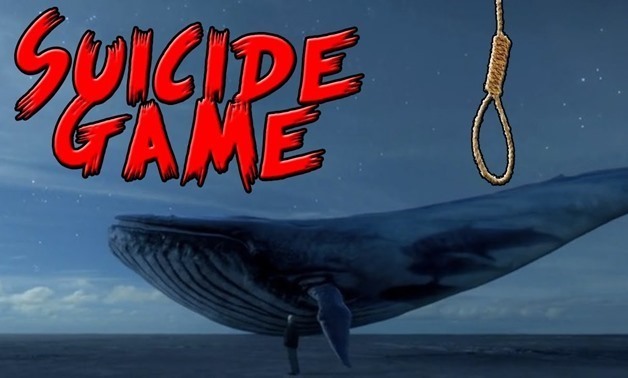
Blue Whale Suicide Game, Mar 10, 2017 – YouTube/Scare Theater
CAIRO – 21 April 2018: One of the victims of the Blue Whale game, who survived an assassination attempt, revealed details of what had happened to him and how his family helped him get rid of the game trap.
The 21-year-old Suez resident, Mohamed Ahmed, said that he fell under the influence of the Blue Whale game after he had long suffered from psychological problems as a result of some clashes between him and his friends, which prompted him to escape his problems by playing the game.
"At the beginning of the game, I used one of the sharp objects to draw the whale on my hand. During this time, I lost control over myself, my mind and all senses,” Ahmed said, stressing that he fell under the control of the game in a strange and incomprehensible way, especially after he was ordered to read some words in Hebrew.
Ahmed stated that he was seeing ghosts in the mirrors of his house and on the walls at the latest stages of the game.
Ahmed explained that he was later asked to harm his family and then to commit suicide. “At this point, my family intervened and began to control me as they confirmed. At times I did not feel what was happening.” He called on all young people to stay away from this game and not to think about its experience because it is deadly and destructive and it ends either by death or suicide.
Despite the awareness campaigns that have been raised recently in media outlets against the deadly online game, Beheira Governorate has seen another case of an Egyptian teenager committing suicide after playing the game, putting in question the effectiveness of these campaigns.
The 12-year-old Egyptian child committed suicide by taking poisonous pills on Thursday; implementing the orders throughout the stages of the 50-task game. The case was linked to the Blue Whale game after initial investigations showed that the Blue Whale-shaped sign was carved onto his arm.
In the wake of the death of former parliamentarian Hamdy Al-Fakhrany’s son, which was also linked to the Blue Whale game, Dar Al-Ifta issued a fatwa (religious edict) prohibiting playing the online game.
In its statement, Dar Al-Ifta stated that suicide, in all its forms, is strongly prohibited and considered one of the greatest sins in Islam, adding that the Blue Whale goads people into killing themselves and therefore playing it is a sin.
Gamal Farwez, professor of psychology at the American University in Cairo, told Egypt Today that it’s not the game that leads teenagers to commit suicide, but rather those who tend to play these kinds of games already have psychological problems, which the game administrators take advantage of.
He blamed the parents, explaining that they should speak to their teenagers and observe their behaviors, warning about the signs of depression. He also asked parents to be more vigilant in monitoring their children’s online activity.
He stated that if children tend to isolate themselves and are nervous most of the time, then parents should take them to specialists.
As for the government's role in blocking these deadly games, Ahmed Zidan, secretary of Parliament's Information and Communications Technology Committee, told Egypt Today that he will propose a draft law to Parliament that permits a state body – the Ministry of Communications and Information Technology or the National Telecommunications Regulatory Authority (NTRA) – to censor these games before being launched in the Egyptian market.
He added that the draft law will include an article stating that there should be censorship on the advertisements broadcasting this kind of destructive game.
Egypt is not the first Arab country to witness a suicide attempt because of the Blue Whale game. Many Arab countries have been on edge due to the number of Arab teenagers getting involved in the game. In Algeria, at least four teens have killed themselves while playing the game, and experts warn that the effect could be far-reaching.
In Tunisia, a 12-year-old boy committed suicide on Feb. 11. Since then, more than ten cases of suicide among children and teenagers were reported, the latest on Feb. 26.
In central Tunisia, two girls were transferred to a hospital after attempting suicide. The mother of one of the girls told Tunisian media that her daughter tried to kill herself after completing 25 of the game’s 50 instructions. The Tunisian authorities are raising awareness on the online self-harm game.
Since starting in Russia, the game has been linked to at least 130 teen deaths across Russia.
The 22-year-old Russian creator of the Blue Whale game, Philipp Budeikin, was sentenced to three years in jail in August 2017 for inciting Russian youths to kill themselves.
He confessed that he convinced about 16 young girls to end their lives, saying that he thinks that his victims were just “biological waste”, and he told the police that they were “happy to die” and that he was “cleansing society”, according to Russian newspapers.
“Mariam”, a Saudi-produced online horror game, can also be compared to the Blue Whale Challenge because of its dark overtones and personal instructions.
While Mariam has not been linked to suicides or self-harm, critics said it prompts children to disclose private information that could be used against them.

Comments
Leave a Comment